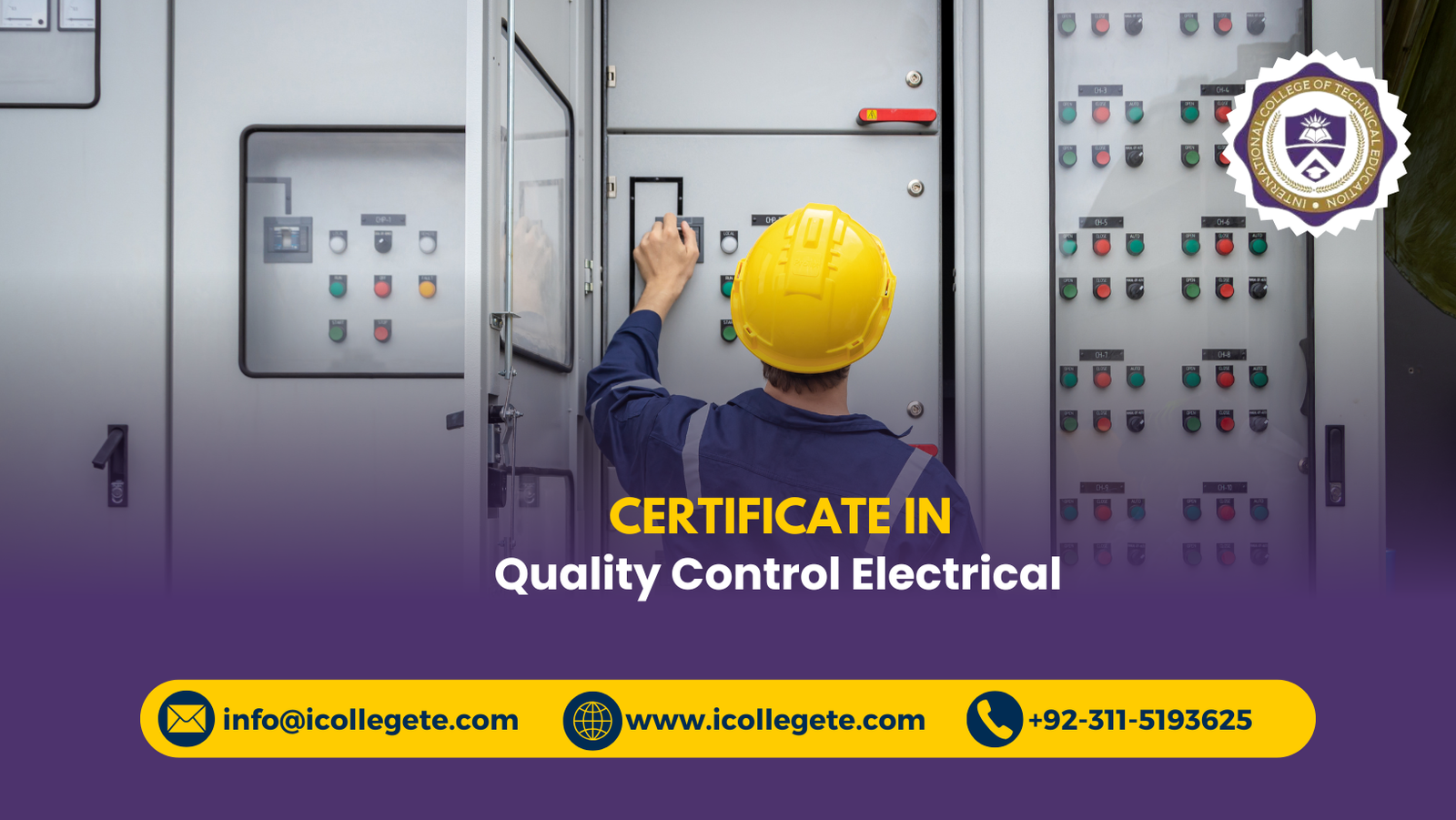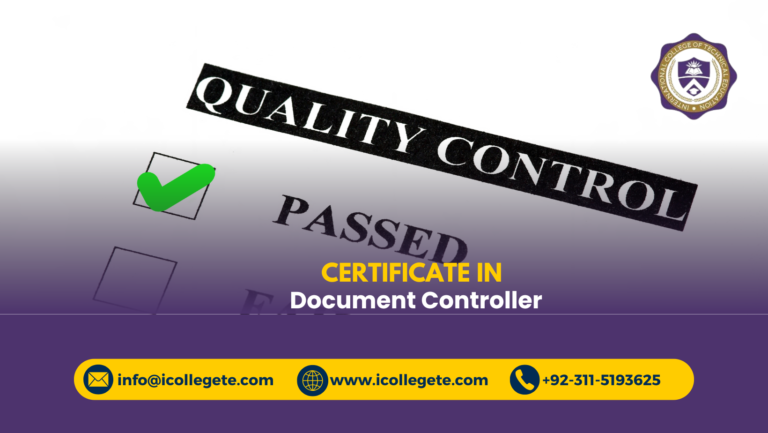The Quality Control Electrical course in Jhelum is designed to equip learners with the technical expertise required to ensure the quality, safety, and reliability of electrical systems and components used in industrial and commercial settings. As the electrical and electronics industries continue to expand, the demand for skilled quality control professionals who can inspect, test, and verify electrical installations and products is increasing rapidly. Quality Control Electrical course in Jhelum provides a solid foundation in electrical quality control practices, inspection procedures, and testing techniques aligned with industry standards.
Participants will gain practical skills in inspecting electrical panels, wiring systems, switchgear, and electronic devices using modern instruments and testing equipment. The Quality Control Electrical course in Jhelum emphasizes a hands-on approach where learners practice identifying defects, interpreting electrical drawings, and ensuring compliance with safety regulations and quality specifications. Quality Control Electrical course in Jhelum will also learn how to maintain detailed documentation, use measurement tools accurately, and follow standardized testing protocols.
In addition to technical skills, the Quality Control Electrical course in Jhelum focuses on quality assurance methodologies, process control, and continuous improvement practices essential to effective electrical quality management. Learners will explore topics such as statistical analysis, defect reduction strategies, and compliance with regulatory standards. Quality Control Electrical course in Jhelum holistic approach ensures that graduates are capable of contributing to organizational productivity and customer satisfaction.
Whether you are a beginner wanting to work in the electrical field or a professional aiming to enhance your inspection and quality assurance skills, the Quality Control Electrical course in Jhelum offers a structured pathway to becoming a competent electrical quality control technician. Graduates of the Quality Control Electrical course in Jhelum are prepared to work in electrical installations, manufacturing facilities, construction projects, and maintenance units.
Course Overview
- Understanding the fundamentals of electrical quality control
- Learning inspection and testing techniques for electrical systems
- Using measurement instruments accurately and safely
- Interpreting electrical blueprints and technical specifications
- Developing skills for defect analysis and troubleshooting
- Ensuring compliance with electrical safety and quality standards
- Implementing quality assurance and process control systems
- Enhancing operational efficiency and product performance
Course Study Units
- Introduction to Electrical Quality Control
- Electrical Drawings and Specifications
- Inspection of Wiring and Electrical Installations
- Testing of Electrical Panels and Components
- Use of Measuring Instruments and Tools
- Quality Assurance Systems and Compliance Standards
- Defect Identification and Root Cause Analysis
- Statistical Quality Control Techniques
- Documentation and Quality Reporting
- Continuous Improvement in Electrical Quality Management
Course Learning Outcomes
- Understand principles of electrical quality control and assurance
- Inspect wiring systems, panels, and electrical components accurately
- Use electrical testing and measuring equipment effectively
- Interpret technical drawings and specifications
- Identify defects and implement corrective actions
- Apply statistical and process control techniques
- Ensure compliance with safety and quality standards
- Maintain quality documentation and inspection records
- Enhance troubleshooting and analytical skills
- Improve operational efficiency in electrical projects
- Contribute to continuous improvement initiatives
- Increase product and installation reliability
- Work effectively as part of a quality control team
- Communicate inspection findings professionally
Entry Requirements for this course
- Minimum education of high school or equivalent
- Basic understanding of electrical or technical concepts
- Interest in electrical quality control and inspection roles
- Ability to participate in practical exercises and workshops
- No prior experience required but advantageous
- Good communication and analytical skills
- Willingness to learn measuring and testing instruments
- Commitment to completing study units and assessments
- Attention to detail and accuracy in inspections
- Ability to interpret electrical specifications
- Problem-solving and troubleshooting mindset
- Motivation for a career in electrical quality control
- Ability to work in industrial environments
- Willingness to comply with safety standards
Course Benefits
- Comprehensive knowledge of electrical quality control practices
- Practical skills in inspection and testing techniques
- Ability to ensure compliance with quality and safety standards
- Improved problem-solving and decision-making skills
- Increased employability in electrical and industrial sectors
- Preparation for roles in inspection, maintenance, and testing
- Experience with modern measuring tools and instruments
- Ability to maintain detailed quality documentation
- Enhancement of operational efficiency and safety practices
- Career advancement opportunities in quality assurance
- Exposure to international quality standards
- Ability to reduce defects and improve product reliability
- Support for continuous improvement initiatives
- Development of professional credibility in electrical QC
Why someone choose this course
- To gain expertise in electrical quality control and assurance principles
- To develop practical skills in inspection and testing electrical systems
- To improve career opportunities in the electrical and power sectors
- To ensure product safety, reliability, and compliance with standards
- To use advanced measuring tools and instruments professionally
- To learn defect analysis and corrective action practices
- To contribute to operational efficiency and defect reduction
- To prepare for quality control roles in industrial settings
- To apply statistical quality control methods in real projects
- To improve communication, documentation, and reporting skills
- To fulfill the demand for skilled QC technicians in the market
- To support safety and quality management in electrical projects
- To stay updated with modern quality control techniques
- To gain professional recognition in electrical quality control
Who can enroll in this course
The Quality Control Electrical course in Jhelum is suitable for students and recent graduates who wish to enter the electrical and electronics industries with a focus on quality inspection and testing. It is also ideal for electricians, technicians, and individuals already working in electrical maintenance or installation roles who want to specialize in quality control. Quality Control Electrical course in Jhelum helps them gain deeper knowledge of inspection tools, testing procedures, and documentation standards required in professional settings.
Professionals currently employed in manufacturing plants, construction projects, or engineering companies who want to enhance their quality assurance capabilities can enroll. Quality Control Electrical course in Jhelum will gain insight into modern quality standards, defect analysis, and compliance practices that improve operational performance. Quality Control Electrical course in Jhelum is especially beneficial for those looking to transition into inspection, testing, or supervisory positions within electrical quality control departments.
Those planning to work abroad or on large-scale industrial projects will benefit from understanding international quality control practices and standards. Learning how to interpret electrical drawings, inspect installations, and troubleshoot defects makes participants valuable assets on construction sites, production lines, or maintenance teams.
Additionally, the Quality Control Electrical course in Jhelum welcomes individuals from related technical backgrounds including electronics, mechanical, and instrumentation seeking to diversify their skill set. Through interactive sessions, practical exercises, and real-world case studies, learners will build confidence and competence. Upon completion of Quality Control Electrical course in Jhelum, participants will be equipped to take on roles such as electrical quality control inspector, testing technician, or quality auditor, contributing to safety, reliability, and efficiency in electrical projects.
Future Progression for this course
- Eligibility for advanced electrical quality control and testing certifications
- Opportunities for supervisory and inspection leadership roles
- Career growth in manufacturing, construction, and engineering industries
- Preparation for roles in quality assurance, testing, and compliance
- Opportunities to work on large-scale industrial and international projects
- Specialization in areas such as non-destructive testing or automation QC
- Ability to progress into electrical quality engineer positions
- Development of skills for continuous improvement and lean practices
- Enhanced chances of working with multinational companies
- Foundation for consultancy roles in electrical quality management
- Improved technical expertise and problem-solving abilities
- Access to networking and professional development forums
- Contribution to safer and more reliable electrical systems
- Pathway to higher studies in electrical engineering and quality management





